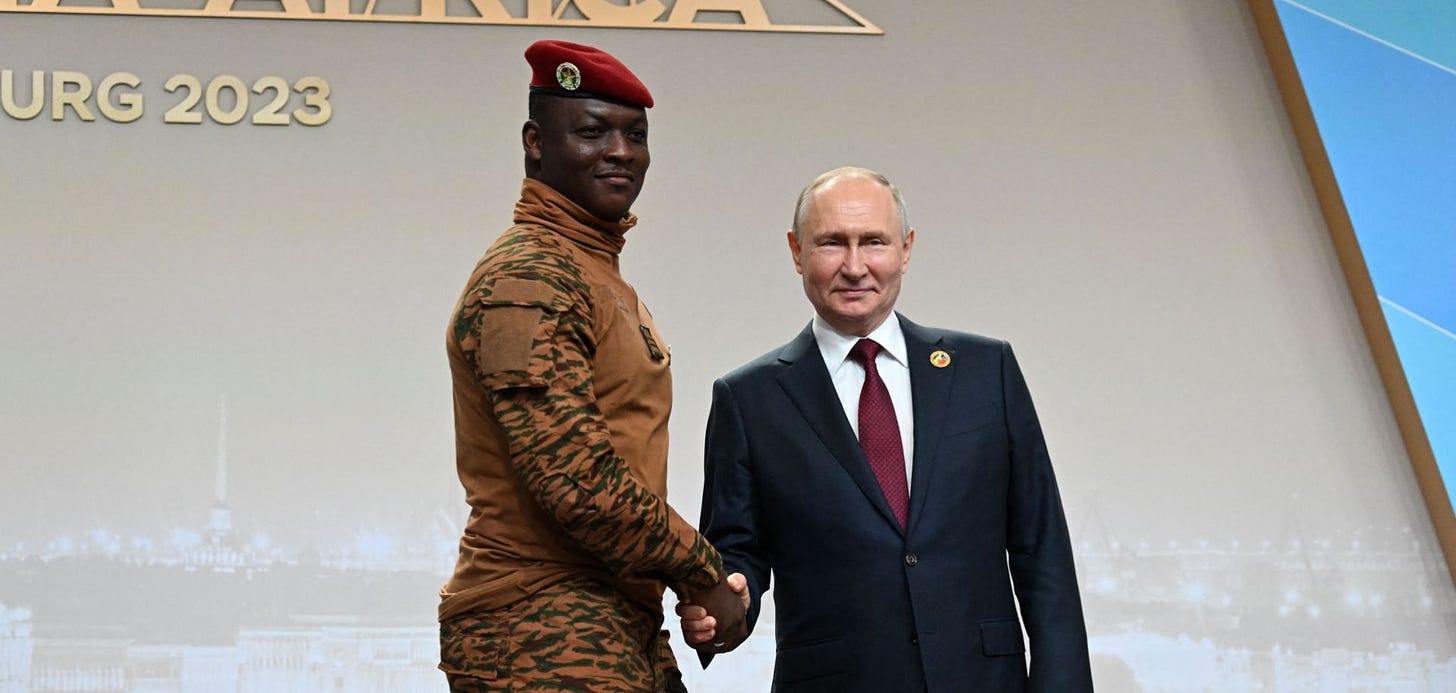
Discover more from The Rod Martin Report
Russia's African Adventurism Reels From Its Syrian Debacle
The Kremlin must consider whether it is able to continue its overseas operations following the loss of a key ally.

NOTE: The Rod Martin Report has long chronicled Turkey’s ambitions to re-establish its hegemony in the Middle East and beyond. Syria may, or may not, be the first domino to fall. The implications for Russia (which we’ve long contended is a Potemkin village facing collapse within a generation) are ugly, in multiple respects but immediately in terms of its ability to support its ongoing African adventure.
Please first read this article, and then at the bottom, watch Peter Zeihan’s excellent video on the ramifications for Russia. Short answer: the fall of Syria is cataclysmic for Putin. — RDM
by Ronan Wordsworth
December 19, 2024
Bashar Assad’s ouster in Syria will likely have far-reaching consequences for close ally Russia, extending even into its operations in Africa. For decades, Syria had been a key logistics center for Moscow, hosting military bases and support facilities critical to Russian activities abroad. With Assad now living in exile in Russia, the Kremlin will have to consider the implications for its Africa operations.
Big Loss
Africa is critical to Russia’s long-term strategy for a number of reasons. Moscow reportedly earns $1 billion annually just from its operations in the Central African Republic, which include trade in illicit gold, diamonds and precious hardwoods. Russia’s management of oil fields in Libya and Sudan is a critical source of foreign currency and helps Moscow circumvent Western sanctions. Russia also has political interests in the continent. African nations have for the most part been reluctant to condemn Russia’s full-scale invasion of Ukraine, and some have even supported its assertion that it’s leading the charge against Western hegemony.
Meanwhile, amid the Russia-Ukraine war, Africa (in addition to Central Asia) has become a key source of labor for Russia, which is facing a growing worker gap, particularly in the manufacturing and services sectors. African labor migrants have been recruited to work at Russian drone and ammunition factories, which are vital to Moscow’s war effort. Finally, the Sahel and Central Africa have become an avenue through which Russia can threaten NATO’s southern flank – by, for example, facilitating another migrant wave on southern Europe, potentially sowing discord among EU members. Russian military personnel and missiles deployed to Libya are also a valuable source of leverage for Moscow in future negotiations with European governments.
But Moscow’s presence across Africa could be in jeopardy with the future of its partnership with Syria uncertain. Russia’s naval base at Tartus – leased to Moscow in 1971 by Hafez Assad, the father of Bashar Assad – is its only naval hub in the Mediterranean and has become one of its most important installations for overseas operations. In 2017, Moscow’s access to the base was extended with a 49-year lease, thanks in part to its decisive role in propping up the Assad regime since 2015.
Russia and Russian mercenary groups have also been using the Hmeimim air base in Latakia as a staging ground for operations in Africa. Without access to the Hmeimim air base, Russia’s only ally in Africa reachable by aircraft without requiring refueling would be Libya, and even that could be challenging considering it would require flying directly over Turkey. These two bases offer logistics support for resupplying arms, ammunition and equipment, as well as personnel rotation, to Russian operations abroad and a hub through which Moscow could export African minerals and oil.
In addition, Russia’s failure to protect Assad could force governments in Africa to question the value of their relationships with Moscow. Russia has developed close ties with several African countries, including Mali, Burkina Faso, Niger, Central African Republic, Sudan and Libya. Officials from Russian state agencies and the Wagner mercenary group have developed close personal contacts with authoritarian leaders in the region to cement these relationships, and in exchange, Moscow was often granted access to minerals or other resources.
But central to maintaining this network was the perception that Moscow could provide some level of protection for leaders who had fallen out of favor with the West. The Kremlin’s inability to save Assad from ouster will force governments across the continent to question this assumption. The junta-led governments in Mali, Burkina Faso and Niger are now undoubtedly wondering if Russia really has the capacity to come to their aid if they face a challenge to their power – particularly considering its potential loss of the Syrian bases.
Seeking Alternatives
The Kremlin must now consider how best to proceed. Russian officials have reportedly been in talks with the rebel groups that led the Syrian rebellion about Russia’s continued access to the Tartus port. Rebel leaders have said that all agreements signed under Assad will not be renegotiated for the time being and that their fates should be up to the Syrian people. The chief of Hayat Tahrir al-Sham, which led the revolt, has not publicly commented on the matter, but considering that Moscow’s support was critical to keeping Assad in power for so long and that Moscow continues to offer safe haven to the Assad family, opposition groups will likely be skeptical of Russia’s peace offerings.
In addition, HTS was heavily supported by Turkey, which has its own interest in preventing Russia from accessing Syrian military or logistical assets. Open-source intelligence indicates that Russian cargo ships and at least two Antonov An-124 cargo planes have already visited the bases in Tartus and Latakia, possibly to withdraw equipment.
Russia will likely consider alternatives in Africa through which it can manage its overseas projects. It has long wanted a base on Sudan’s Red Sea coast. In 2017, the two countries signed an agreement calling for the establishment of a Russian base there. The Port of Sudan had reportedly already been used for limited Russian operations (including refueling and resupply for Russian mercenaries operating in Mali, as well as support for Sudan’s military) prior to Assad’s fall.
However, distance will be a challenge for Moscow. It wouldn’t be able to transport supplies directly to Sudan from Russian territory, so maintaining a permanent base in Sudan could get complicated. In addition, the Sudanese war, now spanning 20 months, has shown little sign of slowing down, which could also threaten the security of any Russian military installations in the country.
Russia’s best-developed network in Africa by far is in Libya. Throughout 2024, Moscow has expanded its military presence there, refurbishing runways at its air base to enable Il-76 cargo planes to land in the country. Russia was granted permanent docking rights at the port of Tobruk in exchange for infrastructure upgrades, though naval facilities there are too underdeveloped for consistent use. Long-term access would require cooperation with the commander of the Tobruk-based Libyan National Army, Khalifa Haftar, who controls the eastern and southern parts of the country. Moscow has been cultivating a relationship with Haftar for some time, but any further investment there could be wasted if he is ousted from the regions he currently controls.
In Algeria, Russia has made clear its desire to construct a port that could be used as a base of operations on the continent. And this could be a good time to initiate talks, considering Algiers’ anger over the European Union’s stance on the Western Sahara dispute and its criticism of the Algerian president. Still, Algeria likely wouldn’t risk its remaining Western partnerships in order to host a Russian base.
In West Africa, countries situated along the Gulf of Guinea could also offer Moscow a base for its operations in the Sahel, though any facilities it manages to construct there likely wouldn’t have the capacity to operate as comprehensive logistics hubs. Countries such as Togo, Benin, Ivory Coast and Ghana are all on the Kremlin’s radar, but the U.S. is also increasing its focus to prevent Russian influence from spreading in the region.
Opportunities for Russia’s Adversaries
With Russia’s options limited, both Europe and the U.S. see an opportunity to limit Russia’s network abroad. It’s highly likely that the United States and Europe are in talks with the new Syrian administration led by Abu Mohammad al-Golani, and that he’s entertaining Russian proposals only to build leverage in future talks with the West.
Meanwhile, Turkey, which has more influence over the new Syrian administration than any other country, is likely to use the situation to limit Russia’s engagement in the Middle East and in Africa, where Ankara is increasingly in direct competition with Moscow.
That Russia was neither able nor willing to help Assad during the rebel advance is an indicator of the pressure facing the Kremlin amid the war in Ukraine. This will likely have a ripple effect for Moscow’s plans in Africa, limiting them to low-effort endeavors such as disinformation and propaganda campaigns and very limited troop deployments. Notably, in the past few weeks, both Chad and Senegal have moved to end their military associations with France, but neither has indicated it will replace the French presence with Russian troops.
Assad’s removal from power is likely to end decades of partnership between Moscow and Damascus. The U.S. and the EU will see Russia’s weakness there as an opportunity to undermine its power projection capabilities elsewhere. Turkey will see this as a chance to ensure Russia can’t rebuild its foothold in Syria through its relationship with HTS. And Russia will have to consider how these developments will impact its strategy in Africa, or even precipitate withdrawal from the continent.
— This essay originally appeared at Geopolitical Futures.
And now, as promised, here’s Peter Zeihan’s excellent analysis of the fallout of the Syrian debacle for Russia. It’s cataclysmic.








